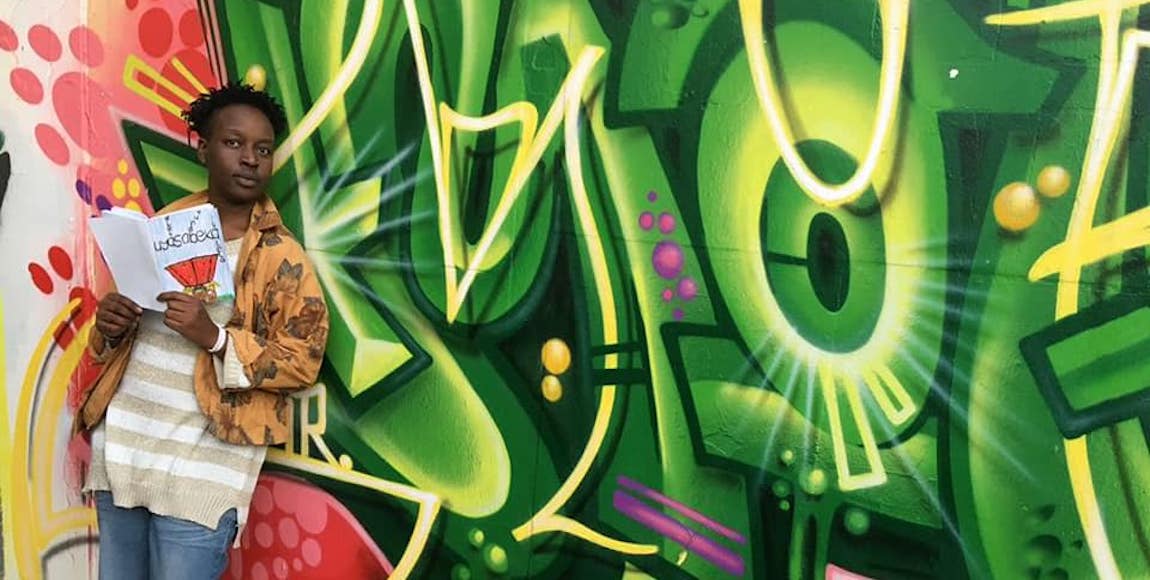Thenjiwe Mswane is a young black queer womxn* that everyone should be talking about. Thenjiwe is a 27-year-old self-publishing author who just recently wrote a book of crosswords and short stories in isiZulu, called Uyesaba uZulu. The Daily Vox spoke to her to find out more about the inspiration behind compiling this book.
My nephew who is turning seven inspired me to write this book. I have always been interested in decolonial conversations, and conversations about language and how we invest in black children. Having been a fallist, and having done a lot of work at university spaces, it felt like we were focusing all of our energy on universities. I felt that we needed to invest part of the energy in primary education, so that by the time students get to universities they understand decolonisation and know their worth as black people entering these spaces.
I’m a writer by profession and I have been writing, but writing in English. For me, when we have conversations around decolonising language, what does that mean if we cannot make our own languages fun and informative? Once I was watching my nephew playing word searches and I saw that there are words that he would never use and I thought, “No man, surely we can teach our children the importance of learning certain words as part of their history,” and took it upon myself to start writing this book.
The book also has eight short stories. The short stories in the book cover four themes, themes that I felt were important for children; more specifically stories Zulu children should all know about. The first theme basically focuses on words we use on an everyday basis, like knowing days of the week in isiZulu, and months and seasons as well.
The second theme was inspired by my Master’s work. It is called Izinganekwane which basically means folk tales when translated in English. This theme is spread out through one very old story that my grandmother always used to tell me when I was young, about a young woman by the name of Siphosethu and her grandmother and uNogwaja [the hare]. She was mainly the inspiration behind the second theme. I put these stories in because I believed that they are a part of our identity. The approach to this theme was also taking into account black feminist thoughts, so I took stories that I remember my grandmother telling me.
The third theme is Umlando. This theme focuses on Zulu queens and princesses who have been erased from history that most young Zulu people never learn about, like Nandi Senzangakhona kaJama and Princess Magogo. This theme was about bringing back those women in power in Zulu history. As part of this section, I write about the appropriate names of locations and villages in KwaZulu-Natal, for example KwaMashu and Umlazi.
The last one is Izi zaka, which means Zulu idioms when translated into English. Here I focused on explaining idioms like ‘Akukho ndlovu esindwa ngumboko wayo’ [no elephant feels the heaviness of its trunk], and what they actually mean to us. These are idioms we hear in most soapies like Uzalo and Isibaya, but most children don’t know what they mean, so this book is also an explainer of such terms.
One of the challenges that I faced while compiling this book was having to go back into reading old books written in isiZulu; I mainly wrote in English and isiZulu is something that I learnt at home. I went to schools where I had to read, think and process information in English. I am self-publishing, and I think self-publishing for me is important so that I own the book and do what I want to do with the book. This meant that money becomes an issue. When you are a black child trying to bring such things to life, it took me about three months to gather enough money to eventually publish my book.
What I hope that people get from this book is learning the importance of taking pride in our blackness. We can make our languages fun. It is very difficult, for example, to ask someone (whether they’re Zulu or not) at university level to pick up a Zulu thesis and read it, because they haven’t learnt the language and it becomes very hard for them to read it. For me, it’s about how do we change the way our languages take the back seat to colonial languages.
the book can be ordered from uyasabeka.zulu@gmail.com or via text on 0609250662. People will communicate preferable methods of payment.
— StabaneLikeTambai (@uThenjiwe_Igama) June 27, 2017
*Womxn is spelled with an x at the request of the interviewee.
As told to Mihlali Ntsabo, edited for brevity and clarity









